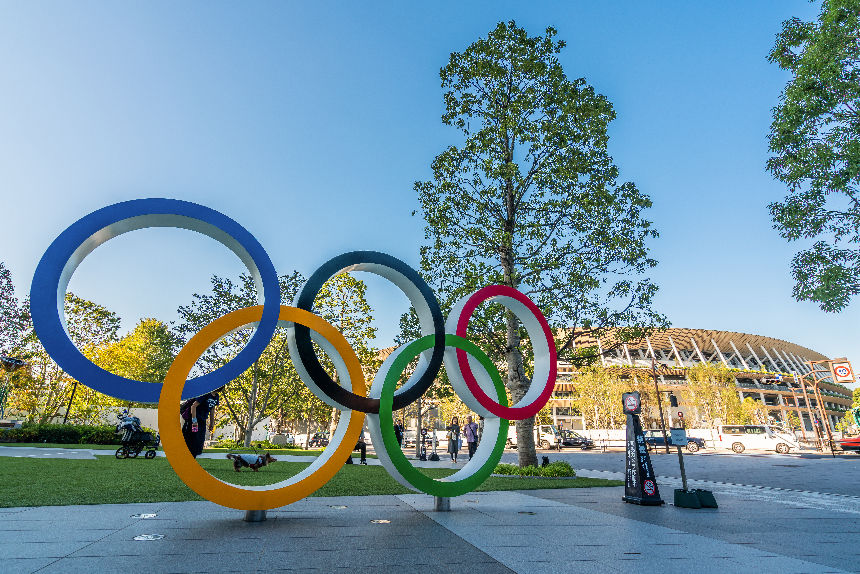The inevitable tides of history often force events to change around them. As you know by now, the 2020 Summer Olympic Games had been scheduled for Tokyo, and have been pushed to 2021 amid the ongoing COVID-19 pandemic. That’s the first time in the history of the modern Olympic Games, which began in Athens in 1896, that a scheduled Olympiad has been moved to another year. However, that’s far from the only time that the climate of world events has forced a change on the Olympic schedule. Here are five times that history itself changed The Olympics.
1. The Cancellations of 1916, 1940, and 1944
In 1912, the International Olympic Committee chose Berlin as the site of the 1916 Summer Games. That year, Germany began building the Deutsches Stadion as the primary hosting location. Unfortunately, the assassination of Austro-Hungarian Archduke Franz Ferdinand in June of 1914 ignited what would become World War I just one month later. With Europe torn apart and Germany allied with Austro-Hungary and Italy against Britain, France, and Russia (and eventually, the U.S.), the IOC cancelled the 1916 games. The 1916 Games were supposed to have featured several days of winter sports as well; that concept was later adapted into the first Winter Olympics in 1924.
A Guide to the Archive: An Intrepid Journalist Covers World War II for The Post. (Uploaded to YouTube by The Saturday Evening Post)
The cancellations of 1940 and 1944 were also due to war. The 1940 Summer Olympics were supposed to happen in Tokyo from September 21 to October 6, a decision made in 1936. The Second Sino-Japanese War, which would soon be absorbed into the larger conflict of World War II, commenced in July of 1937. With that conflict growing, the IOC elected to move the games to Helsinki, Finland. However, when Germany invaded Poland on September 1, 1939, World War II was officially underway. The Games were cancelled soon after. As the war went on, it became evident that the 1944 Games would be cancelled as well. They had originally been scheduled for London, which faced constant bombardment through the War. London did get to host the next Olympics that ran, which occurred three years after the war in 1948.
2. Germany (and Others) Were Banned in 1920
The Saturday Evening Post History Minute: How World War I Changed America (Uploaded to YouTube by The Saturday Evening Post)
World War I drew to a close on November 11, 1918, leaving massive change in its wake. The Olympics were supposed to resume in Antwerp, Belgium in 1920. However, feelings were raw after the war and the nations of the Central Powers had many sanctions levied against them. As such, Germany, the newly established Hungary and Austria, Bulgaria, and The Ottoman Empire (which would be become the Republic of Turkey by 1923) were all banned from competing in the Games that year. For its part, Germany would return in 1928 and host in 1936.
3. The U.S. Boycotts the Summer Games in 1980
The 1980 Moscow Olympics Boycott: Flashback (Uploaded to YouTube by NBC News)
The 1980 Winter Olympics were held in the United States in Lake Placid, New York from February 13 to February 24. American Eric Heiden accomplished an amazing feat, winning five speed skating golds; he set one world record and four Olympic records in the process. He’s still the only person to win five golds at one Winter Games. However, even that mammoth achievement was outshined by the Miracle on Ice, in which a U.S. men’s hockey team made up of college players defeated the Soviet juggernaut to advance to, and win, the gold medal game.
Unfortunately, the worldwide political situation went south on the way to the 1980 Summer Games, which were held in Moscow, in the then-U.S.S.R. After months of internal conflict in Afghanistan, the Soviet Army entered the country on Christmas Eve, 1979, and executed a coup in which the president was killed and a Soviet-chosen leader was installed. Consequently, the U.S. and other Western countries began to back the mujahideen, who were fighting to drive out the Soviet Army. As the international community began piling sanctions on the U.S.S.R. and their allies, the United States decided to boycott the Moscow Games. In the end, 66 countries boycotted the games over the situation in Afghanistan. A few athletes from boycotting nations chose to compete under the Olympic flag.
4. The Soviet Union Responds in Kind in 1984
With the Summer Games scheduled for Los Angeles in 1984, the U.S.S.R. decided that they would boycott the event in retaliation for the previous American boycott. While Romania decided to compete, Russia and thirteen other Eastern Bloc countries under Soviet influence opted out. Two other countries chose not to attend for other reasons. Iran cited “United States interference in the Middle East, its support for the regime occupying Jerusalem, and the crimes being committed by the U.S.A. in Latin America, especially in El Salvador” as their rationale in a statement. Libya boycotted over a dispute with the United States when the U.S. didn’t allow Libyan journalists into the country. Albania skipped the Olympics from 1976 to 1988 for various reasons, but not under an official boycott.
5. The Summer and Winter Split in 1994
Nancy Kerrigan at the 1994 Olympics (Uploaded to YouTube by Olympic Channel)
A confluence of events led to the rather odd prospect of Winter Games being held two years apart in 1992 and 1994. Customarily, the Olympics are held every four years. When the Winter Games were added to the calendar in 1924, the Winter and Summer Games took place in the same year. It remained that way for almost 70 years. The International Olympic Committee vote to split the two was a unanimous decision reached at a meeting in 1986.
The driving force behind the split was the simple fact that the Winter Games were always overshadowed by the Summer Games when they were held in the same year. It was also a massive logistical feat to mount two Games in the same year. Another reason for the separation is that it allowed other countries to shine. The United States and Russia/Soviet Union have a long history of medal dominance across both Summer and Winter Games, but a number of smaller countries excel in the winter sports. The U.S. does currently have the second highest total of Winter medals ever (282), but Norway is at the top with 329. Austria, Finland, Sweden, and Switzerland are also in the Top Ten along with Russia, Germany, the Soviet Union (yes, they don’t exist now, but 194 still keeps them in the Top Five), and Canada. For the record, when it comes to the Summer Top Ten, the smallest countries on the list are Sweden and Hungary, while the rest of the list is rounded out by the United States (#1), Russia, Germany, Great Britain, China, France, Italy, and Australia.
Featured image: The Olympic Rings outside the new stadium in Tokyo (Chaay_Tee / Shutterstock.com)
Become a Saturday Evening Post member and enjoy unlimited access. Subscribe now



